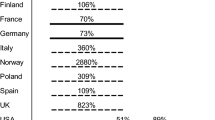Abstract
Leisure contributes positively to the economy. Economists have frequently addressed the effect of leisure time on individual or collective economic outcomes (e.g. wages, productivity, efficiency, well-being). Productive time and free time are seen as enemies: more leisure time tends to reduce individual or aggregate economic performance. But leisure time and income are not necessarily antipoles: to achieve a higher position on the income ladder does not always require spending more hours on work and less hours on leisure.
Access provided by Autonomous University of Puebla. Download chapter PDF
Similar content being viewed by others
The underlying proposition of this essay is that leisure contributes positively to the economy.
Since the path-breaking work of Gary Becker, economists have frequently addressed the effect of leisure time on individual or collective economic outcomes (e.g. wages, productivity, efficiency, well-being). It has often been argued on both theoretical and empirical grounds that productive time and free time are enemies: more leisure time tends to reduce individual or aggregate economic performance.
In the past decades, serious scepticism has arisen on the dichotomy between productive time and leisure time. Both the new economics of happiness (Bruno Frey) and the premise of a positive effect of leisure time on economic efficiency have cast doubt on the trade-off nature of productive and free time. Leisure time and income are not necessarily antipoles: to achieve a higher position on the income ladder does not always require spending more hours on work and less hours on leisure. The idea that more leisure may prompt a lower income position clearly overlooks complementarity effects, especially over a longer time span: leisure activities may enhance individual creativity and skills.
The issue of leisure time in relation to other time has recently been put in an original perspective by Beatty and Torbert (2003) who postulate that, in general, leisure may have a positive influence on someone’s personal development during adulthood as a result of intentional awareness-expanding inquiry from a certain age onward. Consequently, up to a certain limit, leisure is an intrinsically rewarding phenomenon, as it stimulates personal adaptiveness and hence increases the individuals’ extrinsic economic value. Therefore, leisure time may have a positive impact on an individual’s efficiency over a lifetime, and may prompt prosperity in the long run, so that people may also devote more time to discretionary consumption. Future economic expectations may thus positively be influenced by current leisure time. Clearly, the issue of time preferences is at stake here, in relation to the intertemporal elasticity of substitution between consumption.
Human capital is seen as one of the drivers of rising productivity, as it strengthens the quality of labour through a better use of knowledge, skills and health. But clearly, leisure can also positively impact human capital and hence labour productivity. Leisure can act as a productive factor that reinforces individual resilience and health outcomes, so that personal development and happiness are favoured by leisure time. Thus, leisure may positively contribute to labour externalities and hence to productivity results. This modern productivity-enhancing view of leisure of course does not imply that leisurely behaviour always leads to an economic optimum, but this trade-off is a matter of balance to be analysed through empirical evidence.
The new economics of leisure prompts a range of pertinent research questions, in particular:
-
A proper definition of leisure time (e.g. in time dimensions, economic and noneconomic productive activities) and its variety in appearance
-
Conditions under which complementarity between leisure and productive time emerges, at both individual (or group) level and at country (or comparative international) level
-
Causal linkages between leisure time and economic outcome (e.g. income, innovativeness, happiness, psychological well-being, growth)
-
Impacts of leisure on educational performance and skills and hence on quality of human capital
-
Broader economic impacts of leisure time on leisure activity sectors (e.g. tourism, culture, nature)
-
Microanalysis of the heterogeneity in leisure time use in relation to personal needs, self-esteem or quality of life
-
Design of a fit-for-purpose production function with leisure and productive time as ingredients in a compensation model, complemented with the emerging leisure-time-oriented digital technology
Clearly, a new form of dolce far niente economics offers a better understanding of trade-offs and effects in a combined leisure-productive economy.
Literature
Beatty, J. E., & Torbert, W. R. (2003). The false duality of work and leisure. Journal of Management Inquiry, 12(3), 239–252.
Author information
Authors and Affiliations
Editor information
Editors and Affiliations
Rights and permissions
Copyright information
© 2019 Springer Nature Switzerland AG
About this chapter
Cite this chapter
Nijkamp, P. (2019). Peter Nijkamp Recommends “The False Duality of Work and Leisure” by Joy E. Beatty and William R. Torbert. In: Frey, B., Schaltegger, C. (eds) 21st Century Economics. Springer, Cham. https://doi.org/10.1007/978-3-030-17740-9_33
Download citation
DOI: https://doi.org/10.1007/978-3-030-17740-9_33
Published:
Publisher Name: Springer, Cham
Print ISBN: 978-3-030-17739-3
Online ISBN: 978-3-030-17740-9
eBook Packages: Economics and FinanceEconomics and Finance (R0)




